
Mike Nichols was an American film and theatre director. He worked across a range of genres and had an aptitude for getting the best out of actors regardless of their experience. He is one of 19 people to have won all four of the major American entertainment awards: Emmy, Grammy, Oscar, and Tony (EGOT). His other honors included three BAFTA Awards, the Lincoln Center Gala Tribute in 1999, the National Medal of Arts in 2001, the Kennedy Center Honors in 2003 and the AFI Life Achievement Award in 2010. His films received a total of 42 Academy Award nominations, and seven wins.
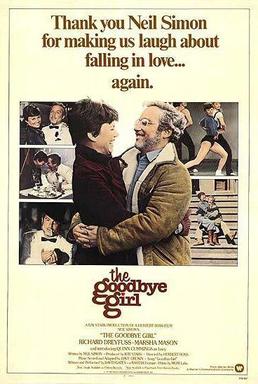
The Goodbye Girl is a 1977 American romantic comedy-drama film directed by Herbert Ross, written by Neil Simon and starring Richard Dreyfuss, Marsha Mason, Quinn Cummings and Paul Benedict. The film, produced by Ray Stark, centers on an odd trio of characters: a struggling actor who has sublet a Manhattan apartment from a friend, the current occupant, and her precocious young daughter.

Marsha Mason is an American actress and theatre director. She has been nominated four times for the Academy Award for Best Actress for her performances in Cinderella Liberty (1973), The Goodbye Girl (1977), Chapter Two (1979), and Only When I Laugh (1981). The first two also won her Golden Globe Awards. She was married for ten years (1973–1983) to the playwright and screenwriter Neil Simon, who was the writer of three of these films.

Private Benjamin is a 1980 American comedy film directed by Howard Zieff, written by Nancy Meyers, Charles Shyer, and Harvey Miller, and starring Goldie Hawn, Eileen Brennan, and Armand Assante.

Carnal Knowledge is a 1971 American comedy-drama film directed by Mike Nichols and written by Jules Feiffer. It stars Jack Nicholson, Art Garfunkel, Ann-Margret, Candice Bergen, and Rita Moreno.
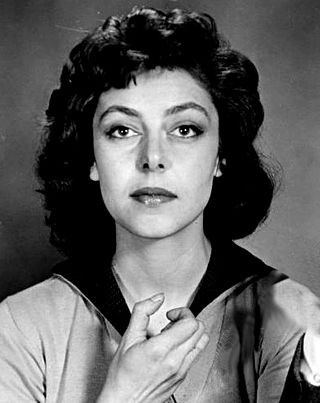
Elaine Iva May is an American comedian, filmmaker, playwright, and actress. She first gained fame in the 1950s for her improvisational comedy routines with Mike Nichols, before transitioning her career regularly breaking the mold as a writer and director of several critically acclaimed films. She has received numerous awards, including a BAFTA Award, a Grammy Award, and a Tony Award. She was honored with the National Medal of Arts from President Barack Obama in 2013, and an Honorary Academy Award in 2022.

James Emil Coco was an American stage and screen actor. He was the recipient of a Primetime Emmy Award, a Drama Desk Award, a Cable ACE Award and three Obie Awards, as well as nominations for a Tony Award, an Academy Award and two Golden Globe Awards. Coco is remembered for his supporting roles in the films Man of La Mancha (1972), Murder by Death (1976) and Only When I Laugh (1981).

Christina Ann McNichol is an American former actress. Beginning her career as a child actress, she rose to fame in 1976 with her portrayal of teenaged daughter Letitia "Buddy" Lawrence in the TV drama Family for which she won two Emmy Awards. Subsequent roles included Angel in the film Little Darlings, Polly in Only When I Laugh, and Barbara Weston in the TV sitcom Empty Nest. McNichol retired from acting in 2001.
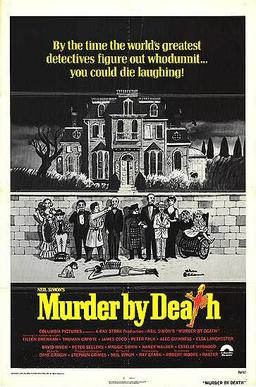
Murder by Death is a 1976 American comedy mystery film directed by Robert Moore and written by Neil Simon. The film stars Eileen Brennan, Truman Capote, James Coco, Peter Falk, Alec Guinness, Elsa Lanchester, David Niven, Peter Sellers, Maggie Smith, Nancy Walker, and Estelle Winwood.
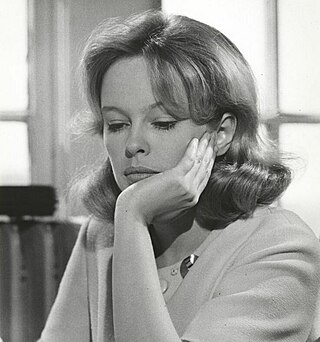
Sandra Dale Dennis was an American actress. She made her film debut in the drama Splendor in the Grass (1961). For her performance in the comedy-drama film Who's Afraid of Virginia Woolf? (1966), she received the Academy Award for Best Supporting Actress.
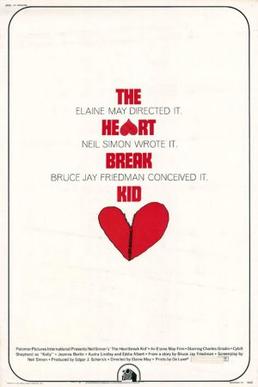
The Heartbreak Kid is a 1972 American romantic black comedy film directed by Elaine May and written by Neil Simon, starring Charles Grodin, Cybill Shepherd, Jeannie Berlin, Audra Lindley, Eddie Albert, and Doris Roberts. It is based on the short story "A Change of Plan", written by Bruce Jay Friedman and first published in Esquire in 1966.
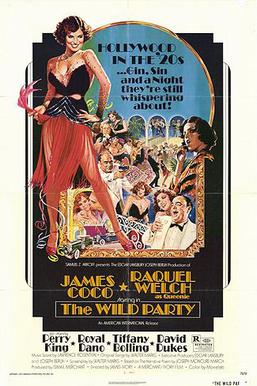
The Wild Party is a 1975 American comedy-drama film directed by James Ivory and produced by Ismail Merchant for Merchant Ivory Productions. Loosely based on Joseph Moncure March's narrative poem of the same name, the screenplay is written by Walter Marks, who also composed the score. The plot follows an aging silent movie comic star of the 1920s named Jolly Grimm attempts a comeback by staging a party to show his new film.
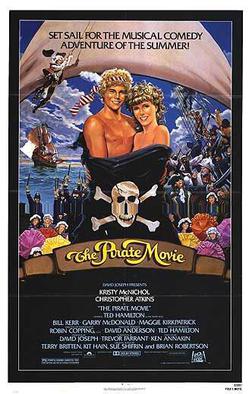
The Pirate Movie is a 1982 Australian musical romantic comedy film directed by Ken Annakin, and starring Christopher Atkins and Kristy McNichol. Loosely based on Gilbert and Sullivan's 1879 comic opera The Pirates of Penzance, the original music score is composed by Mike Brady and Peter Sullivan.

The Devil and Max Devlin is a 1981 American fantasy–comedy film produced by Walt Disney Productions, directed by Steven Hilliard Stern and starring Elliott Gould, Bill Cosby and Susan Anspach.

A New Leaf is a 1971 American black comedy film written and directed by Elaine May in her directorial debut based on the short story "The Green Heart" by Jack Ritchie. It stars May, Walter Matthau, Jack Weston, George Rose, James Coco, and Doris Roberts. Prior to the film, May was better known for her collaboration as a stage comedian with The Graduate director Mike Nichols.

The Return of Swamp Thing is a 1989 American superhero film based on the DC Comics' character of the same name. Directed by Jim Wynorski, it is a sequel to the 1982 film Swamp Thing, having a lighter tone than its predecessor. The film has a main title montage consisting of comic book covers set to Creedence Clearwater Revival's "Born on the Bayou", and features Dick Durock and Louis Jourdan reprising their roles as Swamp Thing and Anton Arcane respectively, along with Sarah Douglas and Heather Locklear.

James Vincent McNichol III, known professionally as Jimmy McNichol, is an American actor and singer who first gained fame as a teen idol in the late 1970s. At the beginning of his career his popularity quickly grew, causing networks like CBS to create and implement multiple television series specifically for his involvement and leading roles. After making a record number of appearances on top talk shows he was viewed by many as "the face you see everywhere."
The Gingerbread Lady is a play by Neil Simon. It was widely believed to have been written specifically for actress Maureen Stapleton, who won both the Tony Award and Drama Desk Award for her performance. But in a later autobiography, Simon wrote that he'd feared Stapleton might be "hurt" if she assumed the character's flaws and personal damage were a direct dramatization of her life. Simon said that it was director Mike Nichols' suggestion to cast Stapleton in the role, and that Simon responded, "This is not really Maureen. It's ten, twenty different actresses I've met over the years."
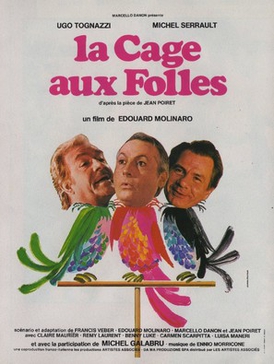
La Cage aux Folles is a 1978 comedy film directed by Édouard Molinaro, based on Jean Poiret's 1973 play of the same name. It stars Ugo Tognazzi and Michel Serrault as a gay couple operating a drag nightclub in a French resort town, Rémi Laurent as the former's son, and Michel Galabru and Carmen Scarpitta as his new fiancée's ultra-conservative parents. The French-language picture was a Franco-Italian co-production by United Artists.
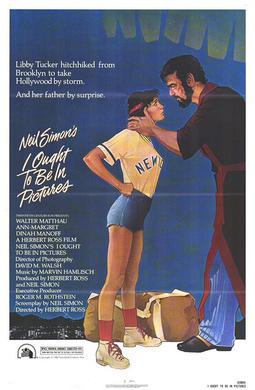
I Ought to Be in Pictures is a 1982 American comedy-drama film directed by Herbert Ross and based on Neil Simon's 1980 play of the same name. The film stars Walter Matthau, Ann-Margret, and Dinah Manoff. Other actors who have supporting roles are Lance Guest, Eugene Butler, David Faustino, Martin Ferrero and Michael Dudikoff.



















